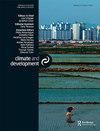Integrating low-carbon development issues into strategic environmental assessment: insights from Tanzania
IF 3.4
3区 环境科学与生态学
Q1 DEVELOPMENT STUDIES
引用次数: 1
Abstract
ABSTRACT Proper integration of low-carbon development (LCD) considerations into policies, plans and programmes (PPPs) using strategic environmental assessment (SEA) is increasingly considered crucial to achieving sustainable development. However, there is little empirical evidence, especially from the developing world, on whether and how SEA is accomplishing this task. This paper analyses five case SEA reports of plans and programmes in Tanzania using a multi-case study design. The aim is to understand how the integration of LCD considerations has played out in practice. A report evaluation framework defined by five review areas and twenty four review questions was used to evaluate the quality of the SEA reports. The results reveal that the integration is patchy across the five cases, with serious deficiencies in conceptualization, scientific assessments, guidelines for implementation, monitoring and follow-up mechanisms and public participation. The average SEA report quality score is 21.6 out of 50 points. The low performance is evidence of a missing link between climate policy and regional/sectoral development planning supported by SEA in Tanzania, reinforcing the urgent need for improvement. Lessons from the Tanzanian cases are broadly relevant for addressing LCD opportunities and challenges in other developing countries.将低碳发展问题纳入战略环境评估:来自坦桑尼亚的见解
利用战略环境评估(SEA)将低碳发展(LCD)考虑适当地整合到政策、计划和方案(PPPs)中,越来越被认为是实现可持续发展的关键。然而,很少有经验证据,特别是来自发展中国家的证据,证明SEA是否以及如何完成这项任务。本文采用多案例研究设计分析了坦桑尼亚计划和方案的五个案例环评报告。目的是了解LCD考虑的集成在实践中是如何发挥作用的。报告评价框架由五个审查领域和24个审查问题界定,用以评价环评报告的质量。结果表明,五个案例的整合是不完整的,在概念化、科学评估、实施指南、监测和后续机制以及公众参与方面存在严重缺陷。SEA报告的平均质量得分为21.6分(满分50分)。在坦桑尼亚,低绩效表明气候政策与SEA支持的区域/部门发展规划之间缺乏联系,因此迫切需要进行改进。坦桑尼亚案例的经验教训对其他发展中国家应对LCD的机遇和挑战具有广泛的相关性。
本文章由计算机程序翻译,如有差异,请以英文原文为准。
求助全文
约1分钟内获得全文
求助全文

 求助内容:
求助内容: 应助结果提醒方式:
应助结果提醒方式:


